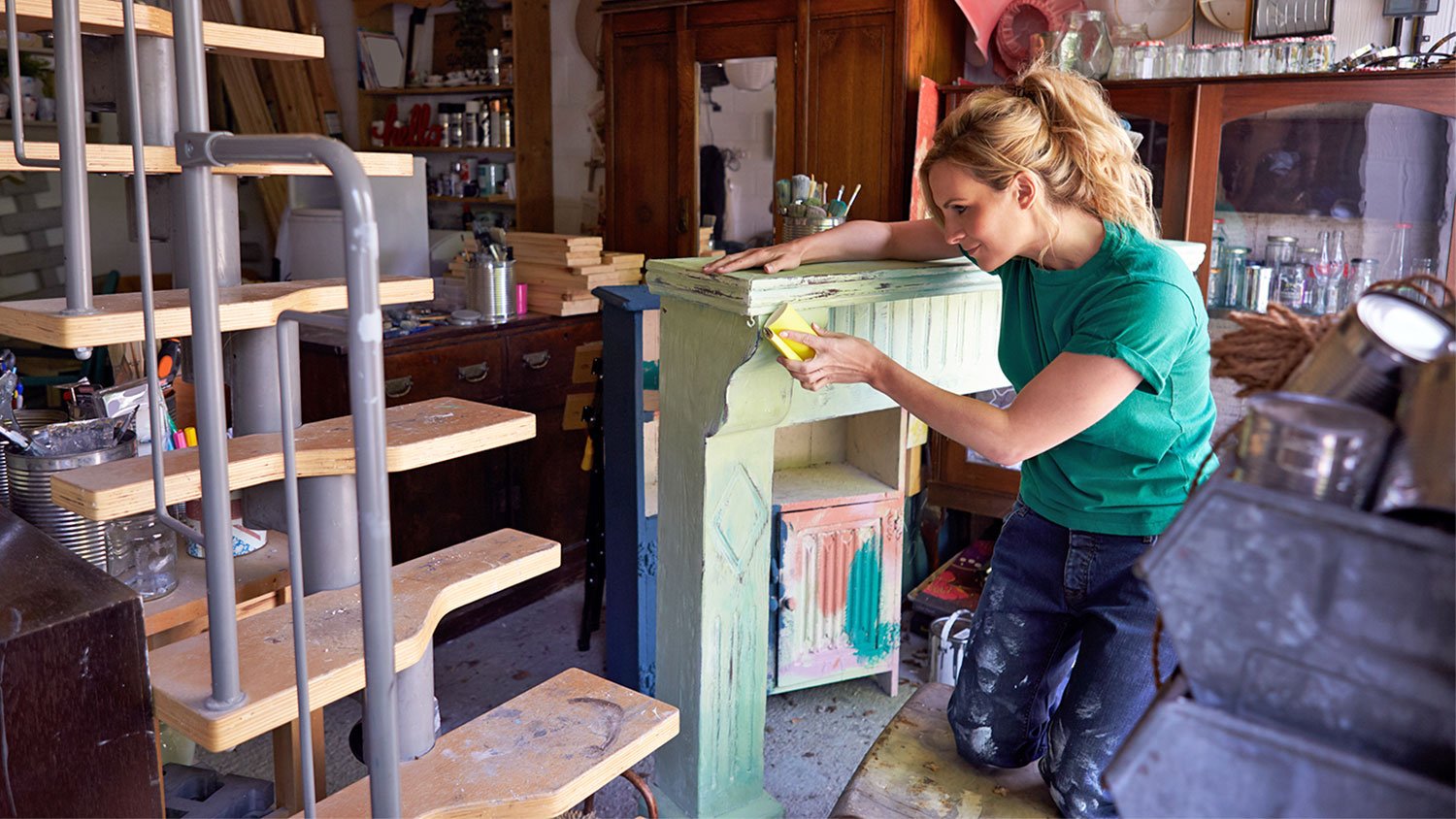How to Chalk Paint Furniture in 6 Steps
Update old furnishings with chalk paint in just a few easy steps.


- Drop cloth
- Painter’s tape
- Paintbrushes
- Paint rollers
- Paint pan
- Can of chalk paint (1 liter for small furniture like a dining chair)
- Chalk spray paint (optional)
- All-purpose cleaner
- Primer
- Furniture wax
If you’re looking for a way to add a little something special to your old pieces of furniture, let us introduce you to chalk paint. This alternative to traditional paint creates surfaces that look as though they’re covered in actual chalk, and even creates the same texture and color gradient to boot. Plus, applying it is no more difficult than what you’re used to—though there are a handful of tricks to keep in mind for the best and most professional-looking results.
Here’s how to paint furniture with chalk paint, from small objects like bedside tables to larger pieces like entertainment centers.
Before You Paint Your Furniture with Chalk Paint
As is the case with any other kind of paint, it’s important to prep your work area before getting started. Move your furniture to a relatively empty area of the house, where you’re unlikely to accidentally make a mess on anything nearby. Cover up what you can’t move with a drop cloth or two. And use painter’s tape to create neat lines and shield any parts that aren’t removable from unwanted splatter.
Remove All Hardware and Disassemble
Before you begin painting, remove any knobs or handles from your furniture and set them somewhere safe (and where you know they won’t get lost!). Then, disassemble the whole thing so each part is easier to paint. For example, remove cabinet doors from bathroom vanities to get into the tight spot that’s normally between the hinges. Or take out drawers to reach the sliding mechanism that’s usually inside.
Wipe and Clean the Furniture
 Photo: aerogondo / Adobe Stock
Photo: aerogondo / Adobe StockUse a microfiber cloth or duster to remove as much dust as possible from your piece. Then, using an all-purpose cleaner or gentle, homemade cleaning solution, wipe down the furniture until no dirt remains. Try to use as little water as possible, especially on wood furnishings, because the extra moisture can cause damage.
Stir the Chalk Paint
To ensure even coloring and consistency, always thoroughly stir chalk paint before applying. Use a wood stirrer or anything else that you have on hand that would get the job done. Or, you can flip the can upside down a few times before opening it to shake up the paint inside.
Apply the Paint
 Photo: anlape / Adobe Stock
Photo: anlape / Adobe StockWith a paintbrush or roller (which you use will depend on the size of your furnishing), apply the chalk paint to each part of the furnishing in even layers. If you’re using spray paint, make sure to set up shop in a well-ventilated area.
Apply a Second Coat
Let the first coat dry completely before applying a second coat. Once that’s dry, evaluate the color to determine whether or not it will need a third coat.
Apply a Wax Coat
Once the paint has completely dried and the color and texture are to your liking, use another paintbrush to apply a coat of furniture wax. The wax coat should be thick enough to protect your furniture from damages and color fading, but not so thick that it attracts dirt or creates visible smears or defaults.
Tips for Applying Chalk Paint to Furniture
Here are a few extra steps that you can take to ensure your chalk-painting project is a complete success.
1. Sand Furniture So Paint Can Adhere
If the piece of furniture that you’re thinking about painting has an unusual surface, or one that paint might not easily adhere to, a bit of sandpaper will save the day. Use 120- to 220- grit sandpaper to remove pre-existing paint, primer, or varnish and you’ll struggle less to add a new coat.
2. Fill in Holes or Chips for a Smooth Finish
Holes and chips don’t just go away because you paint over them. Oftentimes, they’re still visible even after several coats. Eliminate this problem entirely by filling in defaults and damage with wood filler or glue, let it dry completely, and sand to smooth before painting.
3. Apply Primer to Avoid Bleed-Thru
Dark surfaces tend to bleed through chalk paint more easily than traditional paint, but there’s an easy fix for this common problem. Applying a coat of primer before painting will seal the original surface and prevent the color from poking through.
DIY Chalk Painting Furniture vs. Hiring a Pro
Hiring a professional painter for small or medium-sized jobs ranges from $200 to $2,000 on average, according to HomeAdvisor. However, the cost of chalk paint supplies to do it yourself can be as little as $80 for everything involved, so you can save a lot by going the DIY route.
Frequently Asked Questions
You don’t have to, but, on certain surfaces, sanding will allow the paint to adhere more easily.
No. Chalk paint is meant to imitate the look and feel of actual chalk, while chalkboard paint creates a black surface that can be written on with chalk.
Not waxing chalk-painted furnishings leaves their surfaces susceptible to moisture damage and color fading over time.



















